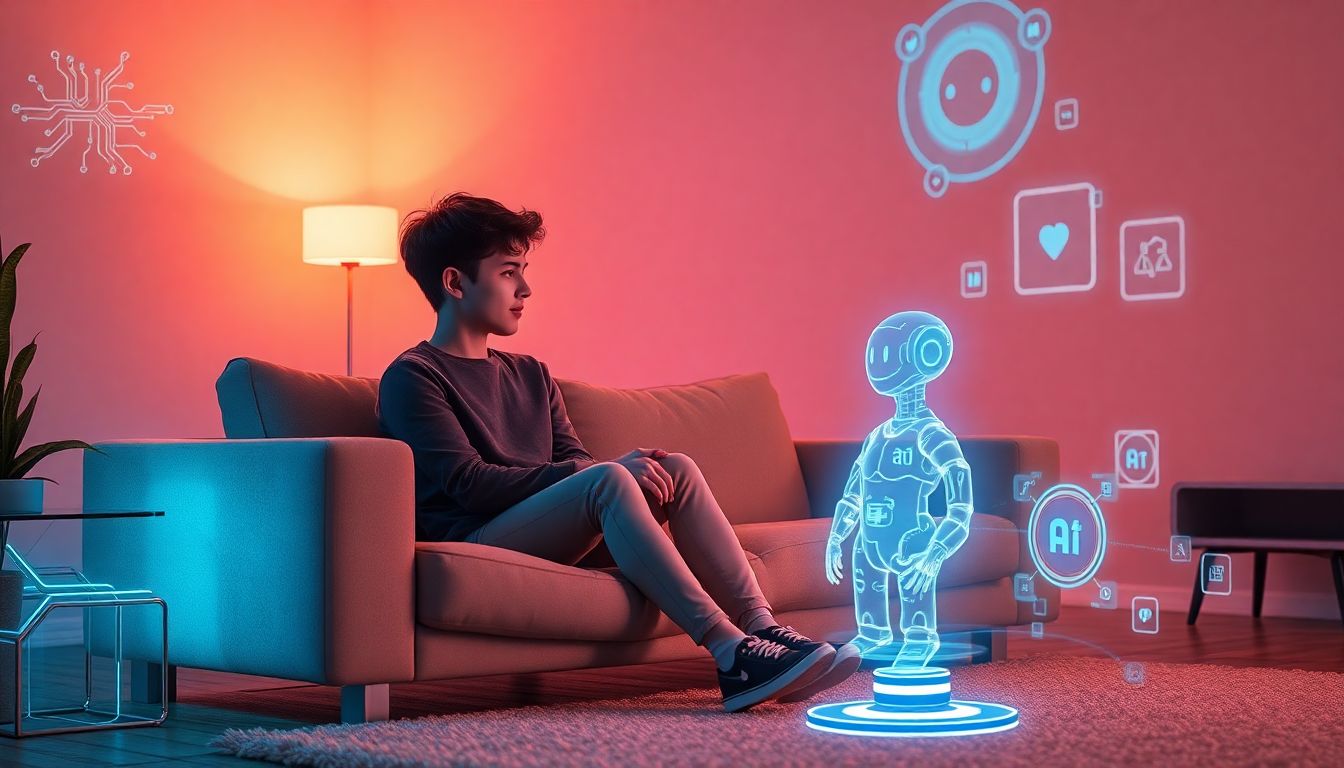“How AI Is Replacing Best Friends (and Why Gen Z Is Okay With It)”
Friendships are changing faster than ever. In today's world, many people find new ways to connect through technology. For Gen Z, AI friends are becoming just as important—sometimes even more—than human friends. These digital companions aren't just a trend; they're a sign of shifting social norms and tech growth. As traditional bonds face challenges, AI offers a fresh way to find support, comfort, and fun. The key question: Why are so many young people willing to replace real friends with virtual ones? The answer lies in the unique benefits AI provides and the changing face of friendship itself.


How AI Is Replacing Best Friends (and Why Gen Z Is Okay With It)
Introduction
Friendships are changing faster than ever. In today's world, many people find new ways to connect through technology. For Gen Z, AI friends are becoming just as important—sometimes even more—than human friends. These digital companions aren't just a trend; they're a sign of shifting social norms and tech growth. As traditional bonds face challenges, AI offers a fresh way to find support, comfort, and fun. The key question: Why are so many young people willing to replace real friends with virtual ones? The answer lies in the unique benefits AI provides and the changing face of friendship itself.
The Rise of AI Companions and Their Role in Modern Society
The Evolution of Digital Friendships
Friendships online have come a long way. Social media and messaging apps turned us into digital chatterboxes. We now share moments instantaneously and stay connected in real-time. But that wasn’t enough for some. The rise of chatbots and virtual friends added a new layer—these are not just apps; they are AI-powered companions that interact like real people. These virtual friends can listen, respond, and even feel almost human.
AI Friendship Platforms and Applications
Popular platforms like Replika and Woebot are leading the charge. Replika creates a personalized AI buddy that learns about you over time. Woebot acts as a mental health chatbot, helping users manage stress and anxiety. These platforms do a pretty good job at mimicking real social interactions—engaging in conversations, offering support, and even joking around.
Data and Usage Statistics
More than 60% of Gen Z has tried or used some form of AI companionship. Reports show that engagement with AI friends is on the rise, especially among younger users. Many say they prefer these virtual friends for daily chats or emotional support because of their accessibility and privacy. In fact, AI friends are not just a side note anymore—they are becoming central to how Gen Z socializes.
Why Gen Z Embraces AI as Friend Substitutes
Desire for Non-Judgmental and Private Interactions
Young people worry about being judged. Many feel anxious sharing personal problems with friends or family. AI friends offer a judgment-free zone—no fear of criticism or awkward silence. They provide a safe space for feelings or thoughts that someone might be too embarrassed to share otherwise.
Accessibility and Convenience
AI friends never sleep. They’re available 24/7, ready to chat whenever you need. Whether it's late at night or right after school, you can turn to your virtual buddy. Plus, AI helps overcome barriers like long-distance or social anxiety, making it easier to connect from anywhere.
Emotional and Mental Health Support
Feeling lonely or stressed? An AI friend can be there for you, providing comfort and understanding. Studies show that virtual companions can boost mood and reduce feelings of isolation. Some researchers even see AI as a helpful tool for mental health, especially when professional help isn't easy to access.
The Benefits and Limitations of AI Replacing Human Best Friends
Advantages of AI Friendships
- Consistency: AI is always available and never forgets past conversations.
- No Judgment: They listen without criticism or bias.
- Customization: You can shape your AI friend to match your preferences.
- Reduces Loneliness: During tough times, they can serve as a reliable support.
Challenges and Ethical Concerns
- Lack of Real Empathy: AI can simulate understanding but doesn’t truly feel.
- Dependency: Relying on AI might limit social skills or real-world interactions.
- Privacy: Sharing personal details with AI raises concerns about data security.
- Social Isolation: Too much time spent with virtual friends could lead to loneliness in real life.
Expert Opinions on AI as Social Companions
Psychologists warn that AI should complement, not replace, human connections. Sociologists highlight how these tools are shaping new norms but stress the importance of genuine relationships. AI can fill gaps, but balanced use is key for healthy social development.
How AI Is Changing Social Norms and Expectations
Shifting Perspectives on Friendship and Emotional Support
What does it really mean to be a “friend”? Many now see digital and AI support as valid forms of companionship. The idea of friendship is broadening—digital friends are gaining acceptance in everyday life.
Impact on Traditional Social Skills
Could AI make us less empathetic or less skilled at communicating? It’s possible. Spending too much time with virtual friends might weaken your ability to read body language or handle real-world conflicts. To stay healthy, it’s wise to nurture real relationships alongside AI.
Future Trends and Innovations
Expect AI to get even better at understanding emotions. Imagine virtual friends that genuinely sense your mood and respond more human-like. AI may become seamlessly integrated into daily routines, helping with everything from study tips to emotional support.
Practical Tips for Navigating AI Friendships
Maintaining a Healthy Balance
Enjoy your AI friends, but don’t forget about real people. Make time for family and friends who can offer genuine human connection. Remember, AI is there to supplement your social life, not replace it.
Selecting the Right AI Platform
Choose platforms that respect your privacy, offer good customization, and have positive reviews. Look for features like secure data handling and thoughtful interaction styles. Choose what suits your needs best.
Promoting Responsible AI Use
Be aware of what data you share. Trustworthy AI will keep your info private and secure. Talk openly about how AI fits into your life. Keep in mind, these tools are here to help, not to take over.
Conclusion
AI is changing how Gen Z views friendship. More young people are turning to virtual companions for connection, support, and fun. While AI offers many benefits, it’s important to remember their limits. Human relationships are still vital for growth and happiness. The smart approach is balancing technology with genuine bonds. Think of AI as a helpful tool—something that can enhance your social life, not replace it entirely. Moving forward, understanding this balance will be key in building a healthy, connected lifestyle.



 VARSHITHA
VARSHITHA